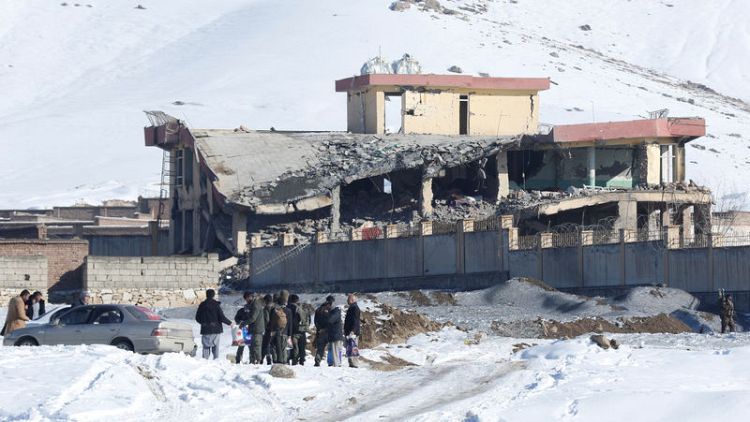By Abdul Qadir Sediqi, Rupam Jain and Charlotte Greenfield
KABUL (Reuters) - With one of the deadliest attacks of Afghanistan's 17-year insurgency just hours before a new round of peace talks, the Taliban rammed home its message that it intends to agree any settlement from a position of strength on the battlefield.
The attack, carried out with a captured military Humvee packed with explosives, killed as many as 100 or more soldiers, police and pro government militiamen at a base in Maidan Wardak province west of Kabul. The base had been run by the National Directorate for Security, the country's main spy agency.
"The Taliban are doing exactly what they want to do and if it goes on like this then one day we will have Maidan Wardak province fall into the hands of Taliban," said Mohammad Akbar Bakhtyari, the deputy chief of the provincial council.
Just hours later, the Taliban confirmed that talks aimed at finding a peace deal had resumed with U.S. officials in Qatar, underlining the strategy adopted by the increasingly invigorated insurgents -- an approach their American foes should understand.
"The U.S. administration's stated policy is to 'fight and talk,' so we shouldn't be surprised that the Taliban are following the same strategy and conducting high profile attacks to strengthen their position at the negotiating table," said Andrew Wilder, vice president of the Asia program at the United States Institute of Peace.
Afghan forces backed by U.S. air strikes have been targeting Taliban commanders, but questions have been raised over the future of U.S. involvement by reports that President Donald Trump wants to bring home almost half of the 14,000 U.S. troops.
Attacks like those on Monday make it harder for Afghanistan's government to show that it can defend itself if the Americans pull out.
The training provided to Afghan forces, the government's intelligence gathering and their assessment of the ground reality all need an overhaul, said a Western diplomat in Kabul.
"The foreign forces provide the training but it all comes down to coordination and effective leadership. That is clearly missing," the diplomat said.
It is a message being carried into the provinces with the bodies of the dead.
Thirteen victims of Monday's attack were repatriated to Laghman province in the east of the country for burial on Tuesday. "If one of our sons is martyred, we send two more to serve the government, but unfortunately the government cannot defend its soldiers," said Shah Wali, a relative of one of them, preparing for the final rites.
LOSING TRUST
After remaining tight-lipped over the casualty toll throughout Monday, the NDS on Tuesday said 36 people were killed and 58 injured in the attack. The figures were below those reported by other government and security sources.
A senior defence source on Monday said 126 Afghan security force members were killed. Two senior security officials in Kabul on Tuesday morning said at least 72 men who were being trained by the intelligence agency were killed at the base and 38 were critically injured.
Video footage showed the collapsed base, which was used by the NDS to train local pro-government military members, nestled among snow-capped mountains with its roof partially caved in.
The government has stopped publishing casualty figures to prevent morale being undermined among security forces suffering what U.S. commanders say are "unsustainable" casualties. Critics say the move is aimed at hiding reality.
"When a soldier sees his comrades die in an incident and knows about the whole reality, but the government or his superior lie about it, that soldier loses the trust," said Atiqullah Amarkhel, a former general who served in the Afghan army between 1960 and 2009.
The increasingly confident Taliban now control broad swathes of the countryside outside the main cities, asserting their authority by collecting taxes and running administrative services as government forces struggle to push them back.
Last week, the insurgents claimed responsibility for a deadly car-bomb attack on a heavily fortified compound in Kabul housing staff working for international organizations. Five people were killed including an Indian national.
"The government doesn't have a precise security plan," said Hassan Reza Yusofi, a provincial councillor in Ghazni province, a province next door to Maidan Wardak. The Taliban overran Ghazni's regional capital for several days in August and still hold some districts.
"We have said this many times, that if the situation goes on like this then we are only going to lose more and more soldiers and at this rate we will witness the fall of provinces faster than ever before."
(Additional reporting by Mustafa Andalib in Ghazni, Ahmad Sultan from Jalalabad, Editing by Peter Graff)
